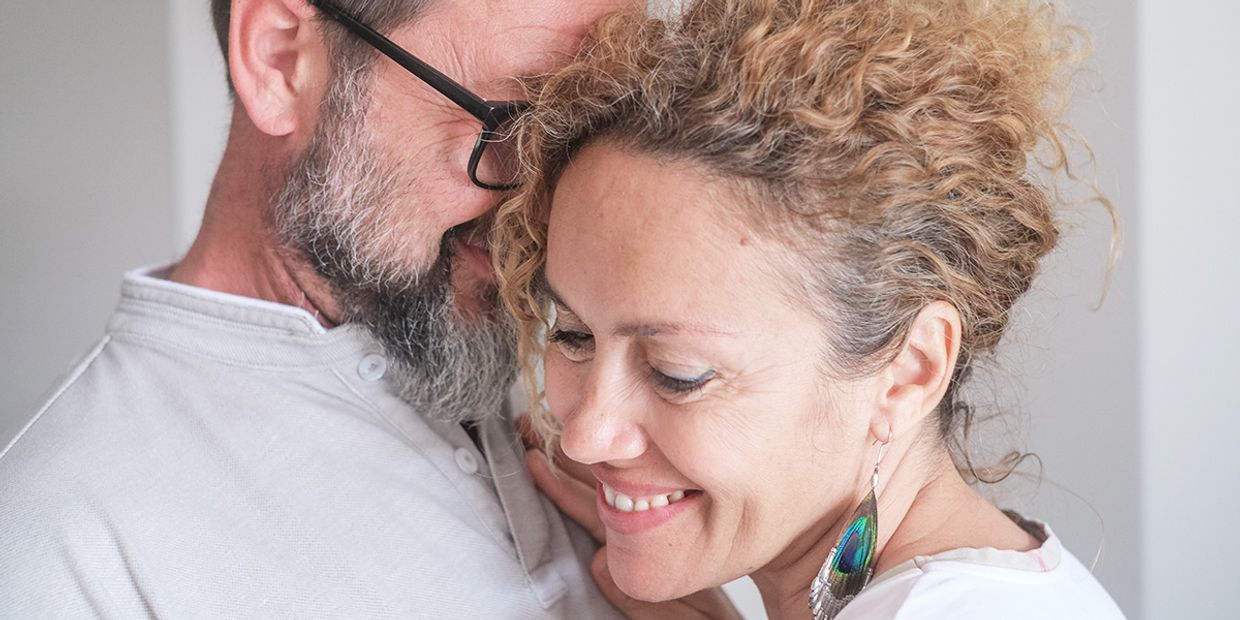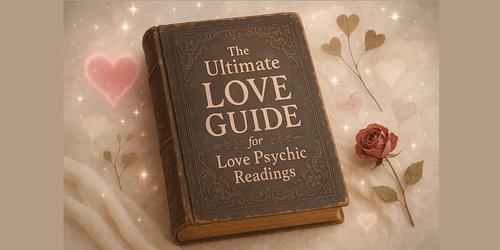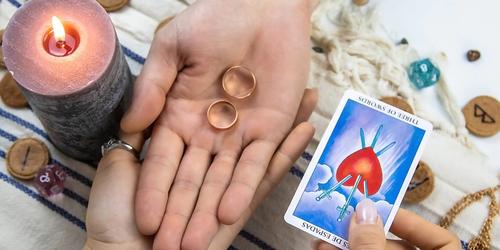
To pay for your reading on your telephone bill, simply call
Instantly message our featured psychics online via psychic messenger.
Click to start
Register now to start your reading online. PSYCHIC MESSENGER- Cheapest psychic service in the UK
- Our readers are available 24/7
- 100% confidential service
- In-depth, concise, personal readings
- Thousands of 5* reviews
Published 06/11/2024 • Updated 07/11/2024 by Joanne Jones
What Is Unconditional Love?
The meaning of unconditional love is giving love without unrealistic expectations. It is a strong expression of love that never wavers, no matter what or who you are.
When we love one another in this way, it's not like the transactional or conditional types of love that typically demand specific things from their partners to create a healthy relationship. When two people love each other without conditions, it lays the groundwork for a trusting, accepting, and understanding healthy relationship where partners may feel safe and loved just as they are.
Additionally, it promotes personal development by helping people embrace themselves and form stronger bonds with others around them as they pursue their true selves.
Selfless love transforms mental health. By focusing less on what others think and expect, you may feel more comfortable and confident in yourself.
Love provides security, allowing individuals to be themselves without fear of rejection or loss and fostering meaningful connections and self-worth.
What Is the Meaning of Unconditional Love?
Unconditional love can be interpreted in many ways. It's about creating a lasting relationship, enduring the rough patches in life, and creating the most beautiful feelings.
Couples who work on their relationship skills, such as empathy, listening and compassion, make relationships where love can thrive even when things get rough.
Unconditional love involves loving one another without judgment, embracing imperfections, and working towards being together. This kind of love brings joy and satisfaction to couples and creates a strong foundation for a successful relationship.
Showing forgiveness is an integral part of unconditional love. Making mistakes is part of any relationship, but letting go and seeing the bigger picture builds the emotional connection between partners.
Trust increases when one partner is confident to take risks and make mistakes without risking rejection. Such trust gives you the comfort of knowing you can face the bumps and bruises in life with your partner. In turn, each partner feels safe and secure in an atmosphere that enhances their emotional state and bond.
Read our guide on What Does Love Feel Like?

What Are the Benefits of Unconditional Love?
Numerous studies and scientific research have been completed to prove there is a positive impact on a couple's happiness when their relationship is built on unconditional love. Below are some of the key research priorities:
1. Attachment Theory and Secure Relationships
As the attachment theory work by John Bowlby and Mary Ainsworth demonstrates, secure attachment (which closely resembles the sense of unconditional love) provides a stable foundation from which people can learn about the world and manage stress.
Research has shown that individuals in safe, supportive relationships are less anxious and more emotionally resilient. Secure attachments, often incorporating elements of unconditional love, are associated with improved mental health and increased relationship satisfaction.
2. Effects on Mental Health and Stress Reduction
Social support studies consistently show that having someone who unconditionally loves you and validates you can dramatically reduce stress.
In one of the most influential papers, Cohen and Wills (1985) advanced the buffering hypothesis that social bonds reduce the effects of stress on mental health. They conclude that those in good, loving relationships suffer less from anxieties about life, leading to fewer mental health issues and even reduced mortality risk.
3. Emotional Resilience and Self-Esteem
Unconditional love empowers self-confidence and naturally gives a positive approach to life. Research by Baumeister et al. (2003) indicates that accepting oneself for what it is without deception increases self-esteem and mental health. Through unconditional love, the feeling of belonging and acceptance enables you to form a better self-image without constantly questioning yourself.
4. Impact on Relationship Satisfaction
Relationship satisfaction research suggests that unconditional love is the best predictor of long-term relationship happiness.
Gottman and Silver's (1999) work on marriage and happiness emphasises empathy, forgiveness, and acceptance, which are the hallmarks of unconditional love. Their research shows that the more a couple shows unconditional love, the less conflict couples have, and the longer they remain together.
Unconditional love revolves around empathy and forgiveness, which have been shown to enhance relationships radically. Forgiveness helps people forget difficult times in the past and creates a healthy relationship that will enable unconditional love.
Empathy, heightened satisfaction, and emotional bonds between partners form a healthy connection, and people report feeling relaxed, closer, and happier.
Finding Your Ideal Partner
Psychics are a valuable resource for those looking for the ideal partner. Psychics or intuitive advisers can provide you with information on the personality traits of a new partner, which may not be evident when you first meet.
Psychics can provide insight into unexpressed emotional states or help find aspects of one's personality that hinder or cause setbacks in a new relationship.
Unconditional love is a winning recipe for building a healthy relationship when combined with instinctual direction.
People can feel more confident in finding the right partner when they approach relationships from a place of self-love and vulnerability and are guided by their own intuition. Being true to yourself encourages individuals to make conscious decisions and not excuses, hoping to change a person’s personality.
Trusted Psychics, experts in love and relationships, have provided support and advice for countless couples who have needed relationship clarity.
These highly rated psychics specialise in giving love readings that help individuals and couples understand the dynamics of the relationship. They provide intuitive information about compatibility, emotional needs, and relationship problems.
Psychic therapy online has become an increasingly fashionable option for couples who are dealing with unhealthy relationships. Through psychic readings and relationship coaching, couples can discuss problems in a safe and comfortable environment where they can address their concerns without the judgment of being face-to-face.
Whether used alone or in tandem, online psychic therapy provides insight that can help you grow in self-awareness, compassion, and honesty. Once couples understand each other's feelings and ways of thinking, relationships can become healthier.

How to Practice Unconditional Love?
Practise Self-Love
Achieving unconditional love begins with cultivating strong unconditional self-love. Loving oneself is a crucial part of this path. Loving oneself entails accepting and appreciating one's intrinsic worth, which in turn fosters optimism and confidence.
Prioritising self-love can help you learn to set healthy boundaries and reject things that bring you down. Consequently, you will have more resources to overcome obstacles and continue living your life.
Empathy and Compassion
The virtues of empathy and compassion are the building blocks of unconditional love and are essential for building meaningful connections with other people. Empathy involves putting oneself in someone's place and feeling their emotions.
Compassion consists of listening, being aware and caring about other people's feelings, and responding appropriately; we make a space where others can feel free to be heard and understood. Resilient relationships are made through breaking down boundaries and fostering full trust.
Forgiveness
Forgiveness is a key aspect of unconditional love, as it heals wounds and allows for an eventual resolution of past grudges. You must forgive others before you free yourself from the psychological and emotional attachments that hold you back.
To forgive is to recognise the harm and let it go from your life; it does not involve approving of destructive behaviour or refusing to acknowledge the damage another person has caused.
Forgiving others is an easy way to start if you wish to create a culture that encourages truth and vulnerability. Unconditional love, acceptance and trust are the cornerstones of such relationships.
Patience and Understanding
Patience and understanding are essential for building unconditional love and enabling graceful and empathetic relationship management.
Being patient means acknowledging that everyone faces challenges, learning curves, and vulnerability.
Patience allows others to express themselves without judgement, building stronger emotional ties. Patience and understanding need active listening and empathy for others' perspectives.
Patience and understanding foster a caring environment that enables open communication and mutual respect.
What Are the Challenges With Unconditional Love?
While unconditional love is admirable, it is not without its difficulties. One big hurdle is the possibility of an imbalance in relationships. Neglect, emotional weariness, and resentment can occur when one spouse constantly provides unconditional love without receiving anything back.
Another obstacle is setting reasonable limits; loving yourself unconditionally does not entail letting yourself be abused or ignored. When people put their needs first, they may experience shame and find it difficult to balance being unselfish and caring for themselves.
Additionally, disagreements and betrayals are examples of hard events that can test the depth of one's commitment and love, which can test unconditional love. The process of processing sorrow and disappointment can cause emotional turbulence.
Finally, many individuals associate love with restrictions or basic expectations, which might make it difficult to grasp unconditional love. It becomes more challenging for individuals to completely accept and practise unconditional love when misunderstandings cause uncertainty and false expectations in relationships.
FAQs on What Is Unconditional Love?
Can Unconditional Love Exist in Romantic Relationships?
In romantic relationships, unconditional love is possible, but only when both partners are willing to put their trust, knowledge, and respect in one another to the test. While it entails loving your spouse unconditionally, setting reasonable limits and catering to each other's needs is critical.
Unconditional love can happen in real life and is the aim of any happy couple: having complete trust and an unbreakable bond between two people.
What Are the Signs of Unconditional Love in a Relationship?
An intimate relationship with unconditional love has various characteristics of a profound emotional connection. Without judgement, partners tolerate each other's shortcomings, fostering open communication.
Romantic partners who selflessly and loyally support each other's dreams. Forgiving mistakes without anger improves emotional well-being for future relationships.
Read our article on Signs You Are in Love.
Is Unconditional Love Always Easy?
Finding emotional strength and devotion in unconditional love is difficult, and many couples continue down the path of an unhealthy relationship. It sounds perfect, but disputes and personal challenges test it.
This requires patience, understanding, and sometimes compromises as one balances one's own sentiments with supporting a loved one. Talking honestly and setting limits to balance personal demands and support is important because this affection might make you vulnerable.
How Is Unconditional Love Different From Conditional Love?
A person who loves unconditionally accepts and supports others without asking for anything in return. They are committed to building strong emotional ties via selflessness, empathy, and forgiveness.
In contrast, conditional love is based on expectations and can cause uneasiness and rejection. The conditional nature of transactional love makes it less solid and nourishing than unconditional love.
Contact Trusted Psychics and discover the benefits of Unconditional Love.
Related Articles
How Quickly Can You Fall in Love?
How Strong Is Twin Flame Love?
Love Spells: Do They Really Work?
How To Contact A Trusted Psychic
Phone a live Psychic 24 hours a day
View all our live phone psychic and tarot readers online.
View All Live readersMessage a live Psychic 24 hours a day:
View all our live messenger psychic and tarot readers online.
launch messengerRecent Articles From the Trusted Psychics Blog

Psychic Love Readings: What They Reveal About Your Relationship
Discover with Trusted Psychics what psychic love readings are and what they reveal about your relationships, from new to existing relationships & ex-partners.

What Is a Psychic Love Reading? The Ultimate Love Guide
Explore our ultimate love guide on psychic love readings & how they can help you with finding your twin flame, soulmate, new love, & whether an ex will return.

The Ultimate Guide to Finding Your Soulmate Through Tarot
Here's the ultimate guide to finding your soulmate through Tarot. Find out what The Lovers, 2 of Cups & 4 of Wands Tarot cards mean for finding your soulmate.

7 Soulmate Myths Unveiled Video
In this video, Trusted Psychics breaks down 7 of the biggest soulmate myths that could be blocking real love & your soulmate connection from entering your life.

Why Choose a Psychic Love Reading?
Why choose a psychic love reading? They offer more than just yes/no responses; a gifted love psychic can interpret your partner’s feelings and his intentions.

The Power of Love Readings Video
Feeling lost in love? This video breaks down what a love psychic reading really is, how it works, and why so many people turn to psychics for love issues.

